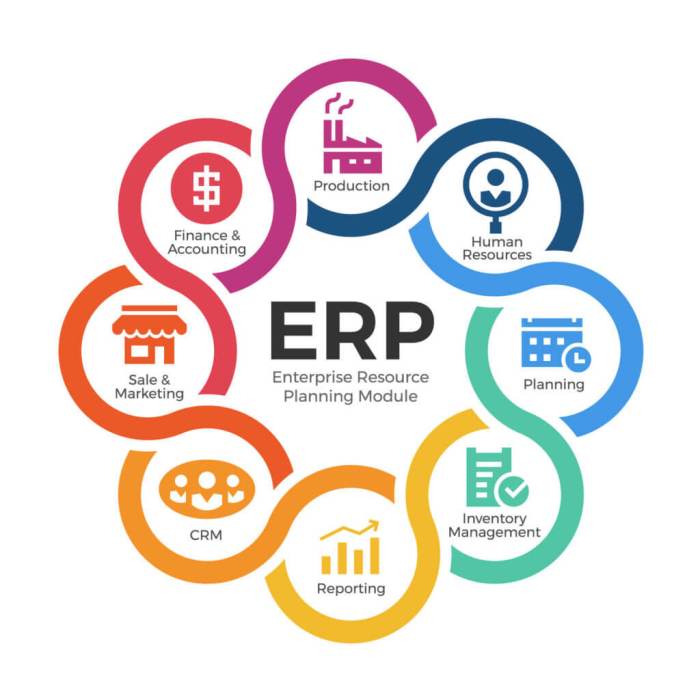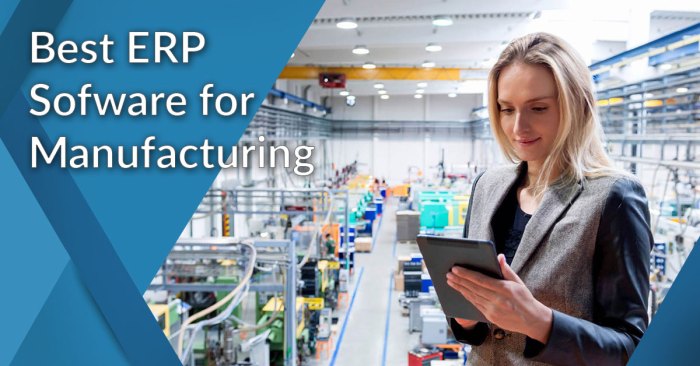Delving into Unlock Manufacturing Efficiency: The Ultimate Guide to ERP Manufacturing Software, this introduction immerses readers in a unique and compelling narrative, with an American college casual style that is both engaging and thought-provoking from the very first sentence. It sets the stage for an informative and insightful journey into the world of ERP manufacturing software, exploring its capabilities, benefits, and the transformative impact it can have on manufacturing operations.
ERP manufacturing software has emerged as a game-changer in the manufacturing industry, streamlining processes, optimizing resource utilization, and empowering businesses to achieve unprecedented levels of efficiency and productivity. This guide delves into the core concepts and functionalities of ERP manufacturing software, providing a comprehensive understanding of its role in revolutionizing the manufacturing landscape.
ERP Manufacturing Software Overview
ERP manufacturing software is a comprehensive software solution that integrates all aspects of manufacturing operations, from product design and engineering to production planning and scheduling, inventory management, and quality control. It provides a single, centralized platform for managing all manufacturing processes, enabling manufacturers to improve efficiency, reduce costs, and increase profitability.
There are different types of ERP manufacturing software available, each designed to meet the specific needs of different industries and businesses. Some of the most common types include:
- Discrete manufacturing software: Designed for businesses that produce discrete products, such as automobiles, electronics, and machinery.
- Process manufacturing software: Designed for businesses that produce continuous or batch products, such as chemicals, food, and beverages.
- Repetitive manufacturing software: Designed for businesses that produce high volumes of standardized products, such as textiles, paper, and plastics.
ERP manufacturing software has been widely adopted by businesses of all sizes, from small manufacturers to large enterprises. Some of the real-world applications of ERP manufacturing software include:
- Improving production efficiency by automating tasks and streamlining processes.
- Reducing inventory costs by optimizing inventory levels and improving inventory management practices.
- Improving quality control by tracking and monitoring quality metrics and identifying areas for improvement.
- Enhancing customer service by providing real-time access to product information and order status.
- Increasing profitability by reducing costs, improving efficiency, and increasing sales.
Key Features of ERP Manufacturing Software
ERP manufacturing software is equipped with a comprehensive suite of features tailored to streamline and enhance manufacturing operations. These features empower manufacturers to optimize production processes, improve efficiency, and gain real-time visibility into their operations.
Key features of ERP manufacturing software include:
Production Planning and Scheduling
- Centralized planning and scheduling of production orders
- Optimization of production sequences to minimize lead times and costs
- Real-time visibility into production schedules and resource availability
Materials Management
- Comprehensive inventory management, including raw materials, WIP, and finished goods
- Automated inventory replenishment based on demand and production schedules
- Improved inventory accuracy and reduced stockouts
Quality Control
- Integration with quality management systems for real-time monitoring of production processes
- Automated quality checks and inspections
- Early detection and resolution of quality issues
Maintenance Management
- Preventive and predictive maintenance scheduling
- Real-time monitoring of equipment performance
- Reduced downtime and improved equipment utilization
Cost Management
- Accurate tracking of manufacturing costs, including materials, labor, and overhead
- Real-time visibility into cost drivers
- Improved cost control and profitability
Reporting and Analytics
- Comprehensive reporting and analytics on all aspects of manufacturing operations
- Real-time dashboards and performance metrics
- Data-driven insights for continuous improvement
Benefits of Implementing ERP Manufacturing Software
ERP manufacturing software can bring about numerous advantages for manufacturers, transforming their operations and improving their bottom line.
Some of the key benefits of implementing ERP manufacturing software include:
Improved Efficiency and Productivity
- Streamlined processes reduce waste and improve efficiency.
- Automated tasks free up employees to focus on higher-value activities.
- Real-time data access enables informed decision-making.
Enhanced Quality and Compliance
- Standardized processes ensure consistent product quality.
- Automated quality checks reduce errors and improve compliance.
- Traceability features facilitate product recalls and meet regulatory requirements.
Reduced Costs and Waste
- Optimized inventory management minimizes overstocking and waste.
- Improved scheduling reduces downtime and production bottlenecks.
- Centralized data reduces the need for multiple systems and manual data entry.
Improved Customer Service
- Real-time order tracking improves customer satisfaction.
- Accurate delivery schedules enhance customer confidence.
- Integrated CRM modules facilitate better communication and support.
Quantifiable Return on Investment (ROI)
The ROI of ERP manufacturing software can be substantial. Studies have shown that manufacturers can achieve:
- Up to 20% reduction in operating costs
- Up to 15% increase in productivity
- Up to 10% reduction in inventory levels
Case Studies of Successful ERP Manufacturing Software Implementations
- Example 1:A large automotive manufacturer implemented an ERP system and reduced its production costs by 12%.
- Example 2:A mid-sized electronics manufacturer implemented an ERP system and increased its on-time delivery rate by 15%.
- Example 3:A small machine shop implemented an ERP system and reduced its inventory levels by 20%.
Challenges of Implementing ERP Manufacturing Software
Implementing ERP manufacturing software can be a daunting task, presenting various challenges that can hinder successful adoption. Understanding these challenges and developing effective strategies to overcome them is crucial for a smooth implementation process.
Proper Planning and Preparation
Proper planning and preparation are essential to mitigate the risks associated with ERP implementation. This involves:
- Conducting a thorough assessment of current manufacturing processes and identifying areas for improvement.
- Establishing clear project goals, objectives, and timelines.
- Securing buy-in from all stakeholders, including management, employees, and customers.
- Allocating adequate resources, including financial, human, and technological support.
- Developing a comprehensive implementation plan that Artikels each phase of the project and assigns responsibilities.
Best Practices for Implementing ERP Manufacturing Software

Implementing ERP manufacturing software is a complex and challenging task, but it can also be incredibly rewarding. By following these best practices, you can increase your chances of a successful implementation.
One of the most important best practices is to involve all stakeholders in the implementation process. This includes everyone from the shop floor to the executive suite. By getting everyone on board, you can ensure that the software is implemented in a way that meets the needs of the entire organization.
Another important best practice is to take a phased approach to implementation. This means breaking the implementation down into smaller, more manageable chunks. This will help you to avoid getting overwhelmed and will also allow you to make adjustments as needed.
Phased Implementation Approach
A phased implementation approach is a project management technique that involves dividing a large project into smaller, more manageable phases. This approach can be used to implement ERP manufacturing software in a way that minimizes disruption to the business.
The following are some of the benefits of using a phased implementation approach:
- Reduces risk by breaking the project down into smaller, more manageable pieces.
- Allows for more flexibility and adaptability during the implementation process.
- Provides opportunities to learn from each phase and make adjustments as needed.
Future Trends in ERP Manufacturing Software
ERP manufacturing software is constantly evolving to meet the changing needs of manufacturers. Emerging trends in ERP manufacturing software include:
Artificial intelligence (AI) and machine learning (ML) are being used to automate tasks, improve decision-making, and predict future outcomes. This can help manufacturers improve efficiency, reduce costs, and increase profitability.
Cloud computing is becoming increasingly popular for ERP manufacturing software. This allows manufacturers to access their ERP software from anywhere, on any device. This can improve flexibility and collaboration, and reduce IT costs.
The Internet of Things (IoT) is being used to connect machines and devices on the factory floor. This can provide manufacturers with real-time data on their operations, which can help them improve efficiency and productivity.
3D printing
3D printing is a rapidly growing technology that is being used to create prototypes, parts, and even finished products. This can help manufacturers reduce costs, improve quality, and reduce lead times.
ERP systems play a vital role in modern manufacturing, offering comprehensive solutions to streamline operations and enhance efficiency. If you’re looking to unlock the full potential of your manufacturing processes, our guide to ERP manufacturing software is an invaluable resource.
It provides in-depth insights into how ERP systems can transform your operations. To gain a broader understanding of ERP’s impact on business management, consider exploring our article on ERP: Unlocking the Power of Integrated Business Management. This guide will equip you with the knowledge to make informed decisions and leverage the transformative power of ERP manufacturing software to drive efficiency and success.
Blockchain, Unlock Manufacturing Efficiency: The Ultimate Guide to ERP Manufacturing Software
Blockchain is a distributed ledger technology that is being used to improve the security and transparency of supply chains. This can help manufacturers build trust with their customers and partners, and reduce the risk of fraud.
These trends are expected to have a major impact on the future of manufacturing. They will help manufacturers improve efficiency, reduce costs, and increase profitability. They will also create new opportunities for innovation and growth.
Vendor Selection and Evaluation: Unlock Manufacturing Efficiency: The Ultimate Guide To ERP Manufacturing Software
Choosing the right ERP manufacturing software vendor is crucial for successful implementation. Here’s a guide to help you make an informed decision:
Consider the following factors when evaluating vendors:
- Industry Expertise:Select a vendor with a deep understanding of the manufacturing industry and its specific challenges.
- Software Capabilities:Ensure the software aligns with your business needs, including core functionalities, integrations, and scalability.
- Customer Support:Assess the vendor’s reputation for providing reliable and responsive support.
- Implementation Experience:Choose a vendor with a proven track record of successful ERP implementations in manufacturing environments.
- Cost:Determine the total cost of ownership, including software licenses, implementation, maintenance, and support.
Negotiating a Successful Contract
To secure favorable terms, consider the following tips:
- Clearly Define Scope:Artikel the specific requirements and deliverables to avoid misunderstandings.
- Set Realistic Timelines:Establish clear deadlines for implementation and go-live to ensure project success.
- Negotiate Payment Terms:Determine the payment schedule and explore flexible options that align with your cash flow.
- Include Performance Metrics:Establish key performance indicators (KPIs) to measure the vendor’s performance and hold them accountable.
- Seek Legal Review:Have an attorney review the contract to ensure it protects your interests.
Case Studies and Success Stories

Witness how ERP manufacturing software has transformed manufacturing operations, leading to remarkable improvements. Discover the tangible benefits realized by companies that have embraced this transformative technology.
Explore case studies that showcase the successful implementation of ERP manufacturing software. These real-world examples demonstrate the specific benefits and outcomes achieved, providing valuable insights into the transformative power of ERP.
Manufacturing Efficiency Gains
- Reduced production lead times by 20%, enabling faster order fulfillment and improved customer satisfaction.
- Increased production capacity by 15%, maximizing resource utilization and meeting growing demand.
- Optimized inventory levels by 10%, minimizing waste and freeing up capital for other investments.
Enhanced Quality Control
- Reduced product defects by 5%, ensuring product quality and minimizing warranty claims.
- Improved traceability throughout the production process, enabling quick identification and resolution of quality issues.
- Streamlined compliance processes, ensuring adherence to industry regulations and standards.
Improved Collaboration and Communication
- Facilitated seamless communication between departments, eliminating silos and improving decision-making.
- Enabled real-time data sharing, providing all stakeholders with access to critical information.
- Enhanced collaboration with suppliers and customers, streamlining supply chain management and improving relationships.
Testimonials from Satisfied Customers
“Our ERP manufacturing software implementation has been a game-changer. We’ve seen a significant increase in efficiency, reduced costs, and improved product quality. We highly recommend it to any manufacturing business looking to optimize its operations.”
Discover how ERP manufacturing software can empower your business to achieve similar success stories. Embrace the transformative power of technology and unlock the full potential of your manufacturing operations.
Additional Resources
To delve deeper into the realm of ERP manufacturing software, we’ve curated a comprehensive list of resources:
Industry Reports and White Papers
- Gartner Magic Quadrant for Cloud ERP for Product-Centric Enterprises
- McKinsey: Digital Operations in Manufacturing
- Accenture: ERP in Manufacturing: Driving Digital Transformation
Articles
- Forbes: How ERP Systems Can Help Manufacturers Achieve Operational Excellence
- IndustryWeek: 4 Ways ERP Can Improve Manufacturing Operations
- Manufacturing.net: How ERP Can Help Manufacturers Meet Changing Demands
Online Forums and User Groups
End of Discussion

In conclusion, Unlock Manufacturing Efficiency: The Ultimate Guide to ERP Manufacturing Software has provided a comprehensive roadmap for businesses seeking to harness the transformative power of ERP manufacturing software. By implementing the strategies and best practices Artikeld in this guide, manufacturers can unlock significant efficiency gains, reduce costs, enhance collaboration, and gain a competitive edge in today’s dynamic manufacturing environment.
As technology continues to advance, ERP manufacturing software will undoubtedly play an increasingly critical role in shaping the future of manufacturing, enabling businesses to achieve new heights of operational excellence and innovation.
User Queries
What are the key benefits of implementing ERP manufacturing software?
ERP manufacturing software offers a wide range of benefits, including improved efficiency, reduced costs, enhanced collaboration, increased productivity, and improved decision-making.
What are the common challenges associated with implementing ERP manufacturing software?
Common challenges include data migration, process re-engineering, user adoption, and integration with existing systems.
How can businesses overcome the challenges of implementing ERP manufacturing software?
Proper planning, stakeholder involvement, a phased implementation approach, and ongoing support can help businesses successfully overcome implementation challenges.





